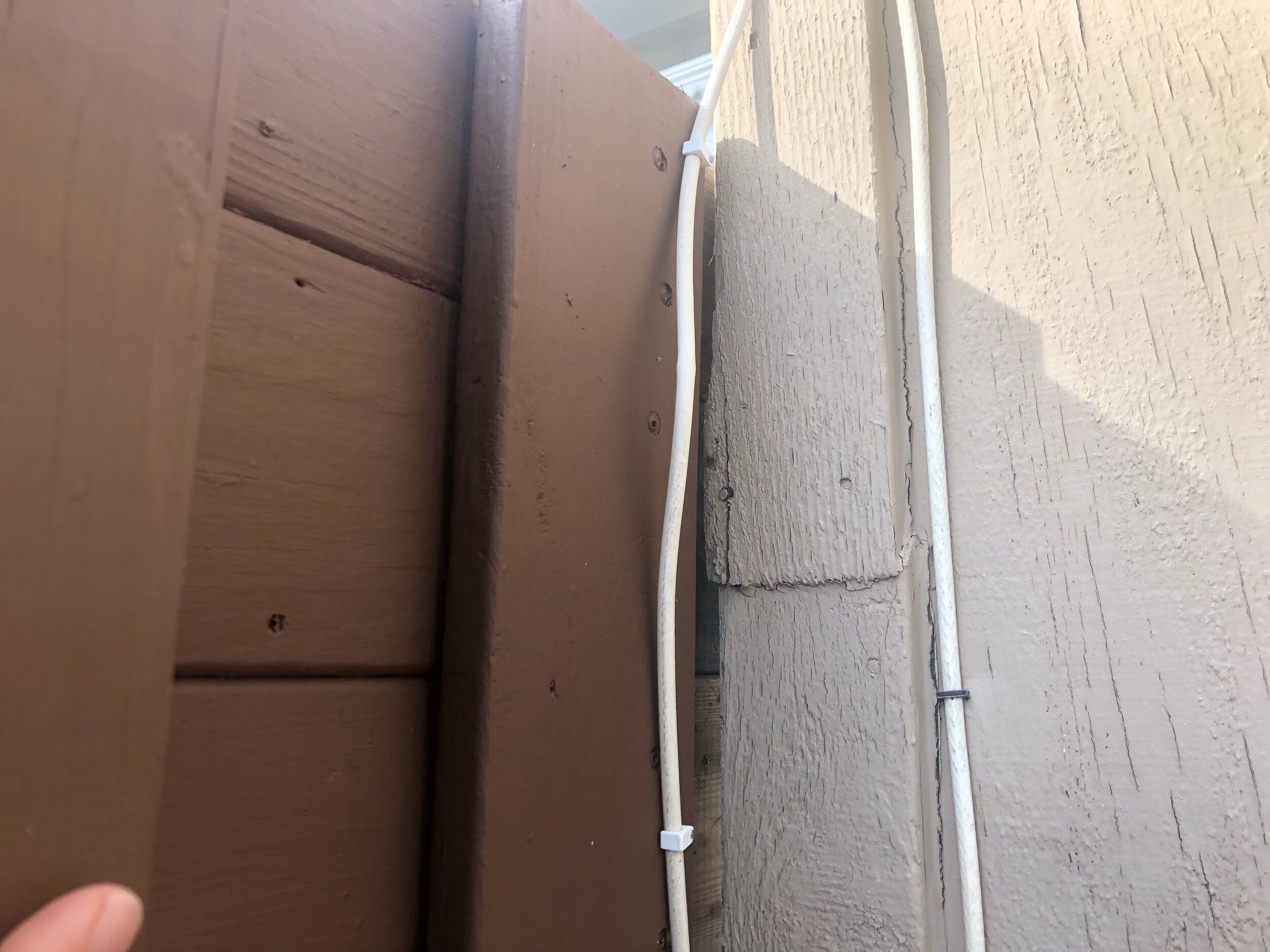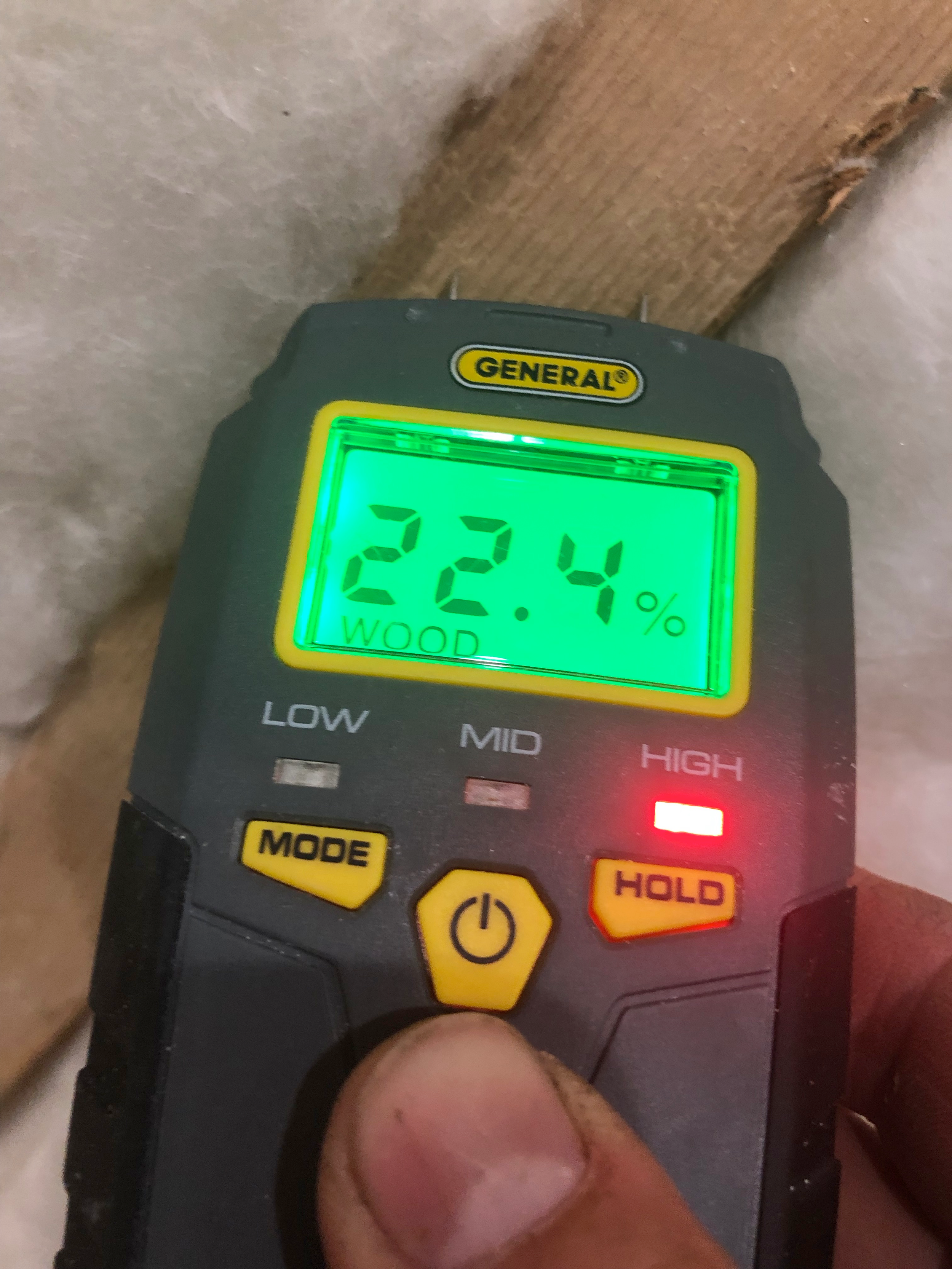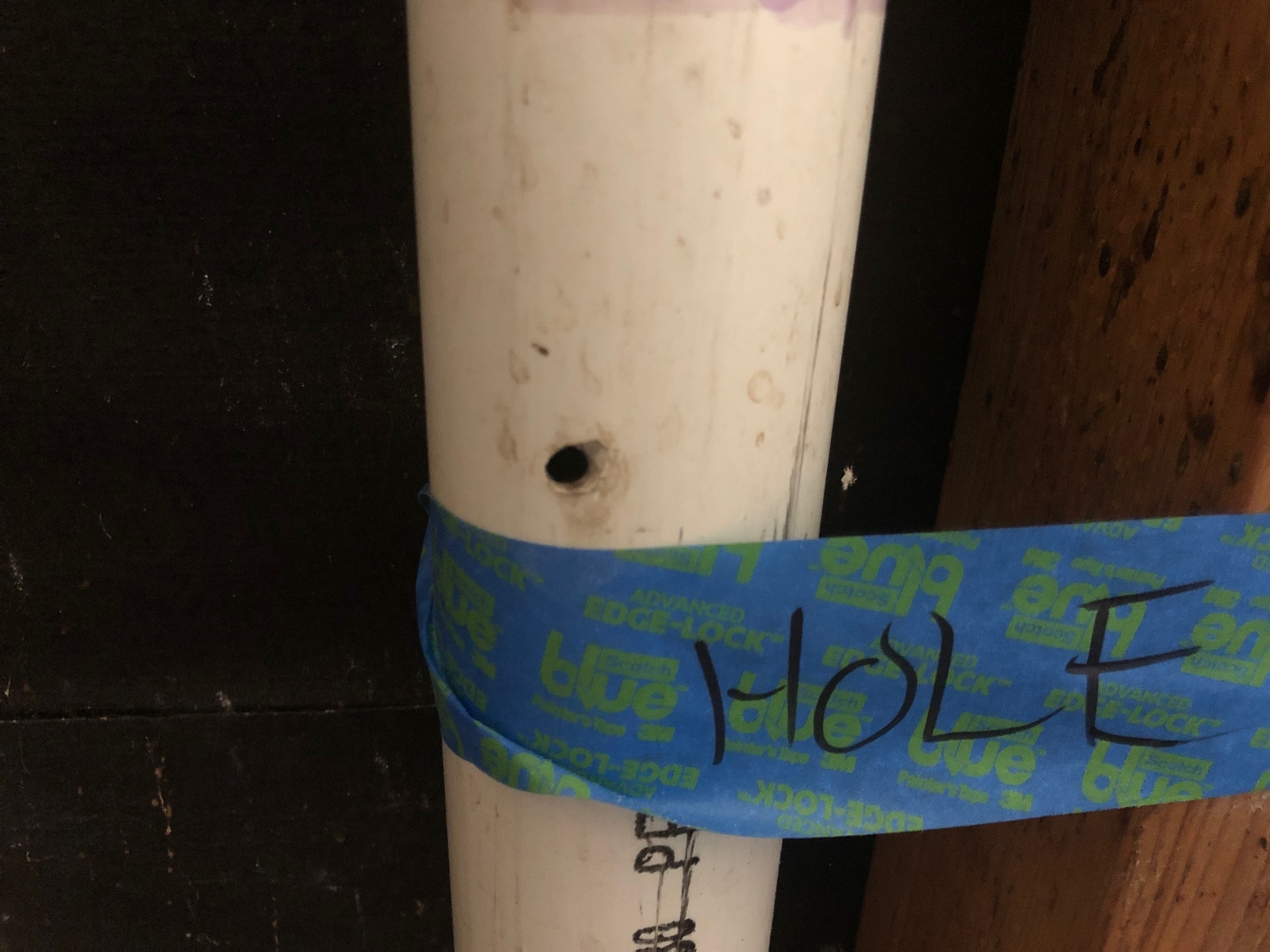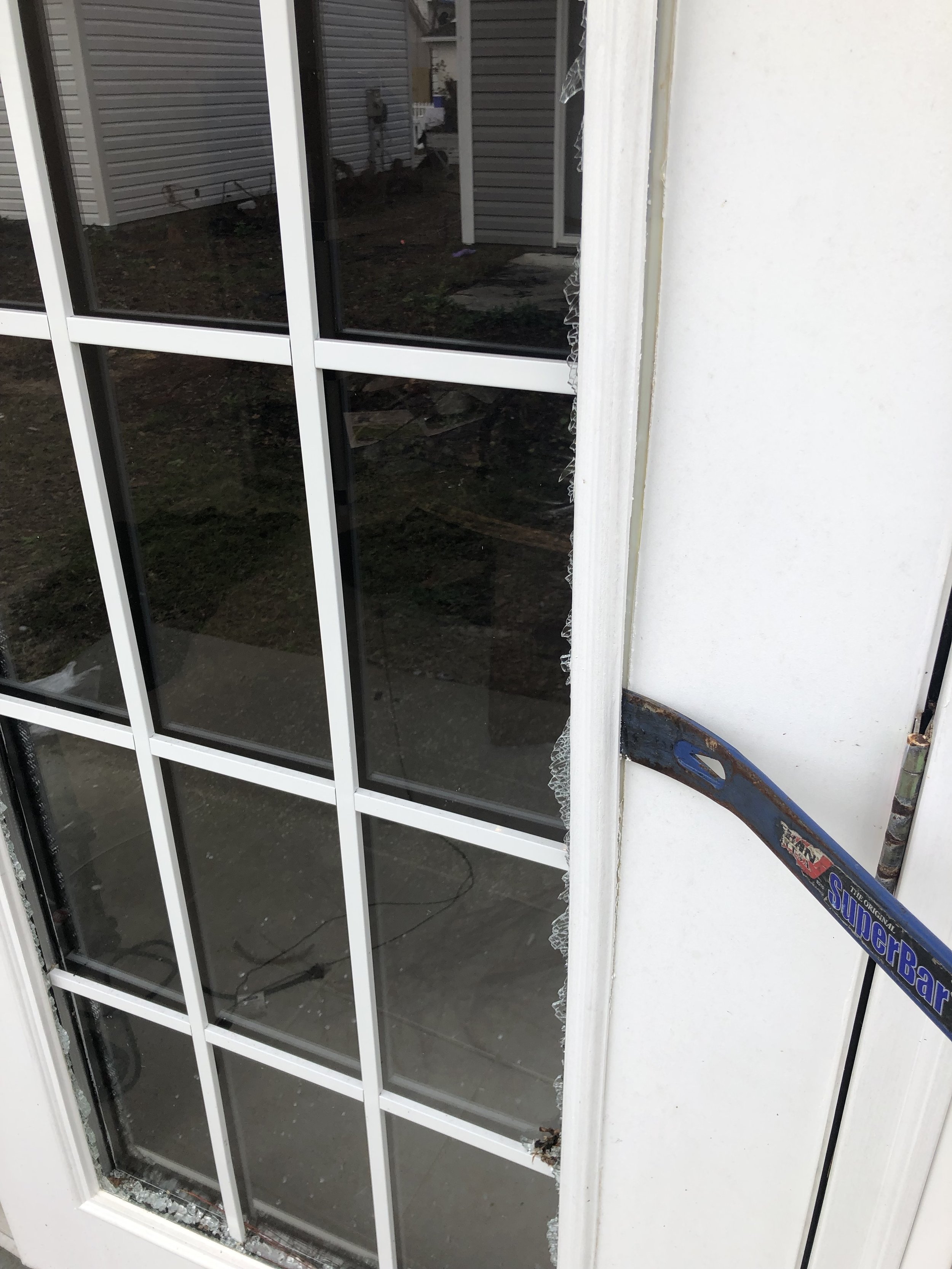So that fence isn't covered because some loophole in your insurance. It wasn't attached to the house! Stupid loopholes. Well here is what happens when you attach it to the structure Mr. paper pusher <-lowercase on purpose. Carpenter bees can and will burrow holes in that wood eventually. They will start at the fence then find a way to the structure. Once inside they can get into your load bearing walls. If severe, much like termite damage, they can affect the performance of the structure. So what is the solution? When you attach a wooden treated or untreated fence to any structure make sure you place aluminum flashing in between the fence and the structure. That way, once the bee hits the flashing it is game over. But what about moisture problems behind the flashing?!? Yep, you've introduced a new problem. You could seal the back with caulk or silicone or you could build from a builders perspective and build whichever way you think is best and not to appease some dude that shows up trespassing with a clipboard. How's that working for ya? In the lowest two pics, this fence was built with a fence post installed next to the structure and the wood was installed "hovering" over the structure allowing for an air gap and a stop for Mr Carpenter Bee. Solved!
Squeaky Steps
How do you correct them? Some say glue them down or add more screws. Recently I watched a video by The build show host Matt Risinger where they used spray foam on the underside of the staircase to lock everything in place. The squeak comes from the wood rubbing togethor and/or the nails/screws rubbing up against the wood when weight is applied. In this case the stairs were removed and the failed glue removed. We replaced it with thick carpet under-pad felt between the wood. This way the only rubbing that can occur is the screws in the wood. So far no squeaks. Only 20 years down the line until we know if this method truly did the trick...🧐
6 P's = Proper Prep Prevents Piss Poor Performance
Hurricane Testing
400 Years of American House Styles, All in One Infographic
From 17th century Post-medieval English abodes all the way to 1990s “McMansions," this detailed diagram of domiciles categorizes 121 American houses in all.
Mold Remediation
There are a couple of ways you can handle this
1: Rip it all out to the studs
2: Hire it out and pay your life savings, because God forbid we do anything ourselves anymore.
3: Burn it all down and start over (I wouldn't roast any hot dogs in that fire though)
Option one is probably your best solution. Once you've got it all ripped out now you want to spray it down with stuff worse than acid..j/k...don't do that. Household bleach is not good enough. A good choice is outdoor 30 second cleaner at the big blue and orange stores. Once sprayed, Don't breath in those fumes! Next you want to dry everything out. If you don't dry it all out, when you build it back you might enclose moisture in certain areas that can't escape. Years later, you'll be back to square one. Steps on drying everything out? How do you know when its dry? A moisture meter is your best friend. It takes out the guess work. It will tell you if the moisture in materials is ok, mid level or too high. Also a Thermometer will tell you how much moisture is in your air. If you dry your materials out and there is no airflow it's all coming back. (Fun fact in our high humid environment: did you know that some old plantation builds used to plant trees in rows alongside towards the house in order to direct airflow through the home when windows and doors were open?) Fans and running the HVAC system can dry your place out but the best way is to buy a dehumidifier. It will collect water from the air and then you can dump it outside. Once your moisture meter checks ok everywhere than its time to start building it all back. Cheers!
Building in the land of the free is not something you ask permission for
FREE
adjective
1. Not under the control or in the power of another; able to act or be done as one wishes.
2. Not or no longer confined or imprisoned.
#Yourland #Yourway #GodisKing
Your Home Inspector Sucks and so do You!
What's that saying? Seeing is believing! Isn't that the truth when it comes time to purchase a property and you hired a home inspector to make sure everything is a-ok. He goes in with his tools and tape measure and piddles around for half the day. When he is all done he hands over a nice document with everything wrong with your potential purchase. Everything, right? Did he catch the 3rd layer of asbestos that couldn't be located? Did he catch the rat that chewed through the 8 gauge wire behind that wall where the copper wires are now touching? Did he make sure all the mechanical breakers are working? What about the nail that went through the "code approved" metal plate protecting that from happening and into the PVC pipe behind the wall? I think not. The home inspector can only do so much. He's not going to rip everything apart to find these issues. So don't blame him when YOU purchase a property that later on has some issues. YOU are the purchaser, grow some balls and fix the damn problem and quit blaming others for YOUR issues. We cannot all be skilled tradesman or brain surgeons for that matter, but when it comes time to hire an inspector if you so choose, find one that does things his way and not by the book, because if we all followed……nobody would LEAD!
Flickering Lights
Finding electrical issues can be difficult. In this scenario we had flickering lights in random rooms at different times within a structure. It didn't seem to be any particular area in the house and the issue was occurring at random times. A multimeter was placed on the incoming wiring in the sub-panel and a Go pro sat recording the meter all day. We were able to playback the footage and see that major voltage changes were occurring. If the issue happened and nothing was picked up on playback then the issue would lie somewhere in the panel in itself (downstream away from test meter reading). Since we were able to capture the issue (When lights flickered 240v would change to 120v to the whole panel) we know the issue is coming from the main panel (upstream) next to the power company meter. Once the main panel was opened the breaker to the sub-panel was located, turned off and removed. Turns out there was a dead frog and lizard on the contacts. The contacts were cleaned with blasts of air and the dead creatures removed (Without touching ANYTHING METAL!). A new breaker was installed matching the model of the old. Problem found and corrected!
Glass door insert replacement
So you’ve got that window broken from Mr. Michael? No problem! Measure it out, then bring the measurement to your local hardware store so the order can be placed. They’ll ship you an exact replacement. All you do is drill out the plastic caps over screws on the interior plastic. Access the screws and unscrew. The interior plastic will pop off. The exterior has a sticky caulk pre applied so you’ll need to shim that off with a flat head screw driver or in this case we used a crow bar. The window will pop out. Back trace your steps to put the new one in. Boom! New Window!
Duplex Restore
UPDATE-Carrier Greenspeed VR 5-ton Heat Pump VS. Frigidaire 5-ton Heat Pump
Update on A/C monitoring. So far it is looking like average savings are $400-$500 / year. If the difference between any regular heat pump install and this install is 4k, then you will start to see a payback after 8-10 years. Is it worth it to you?
Exterior Trim and Interior Refinishing
Are Property Rights Human Rights?
From Forbes:
https://www.forbes.com/sites/davidmarotta/2013/02/18/are-property-rights-human-rights/#c68e9c23c219
Property rights depend on the principle that you own yourself. If you own yourself, then you own the fruit of your labor.
A medieval hunter cuts a branch and sharpens it into a spear. Now he has changed a common stick into a useful tool; he has made personal property. Property rights protect the hunter's investment of labor in the making of the tool. If he uses his spear to kill an antelope, it too would become his property.
A farmer finding a fertile region in the Mesopotamian wilderness plants and irrigates his crops. Having improved the land, it seems right for him to enjoy the fruits of his labor.
Labor, like hunting for meat or planting crops, was eventually traded through currency. Money earned through labor was used to purchase land, goods or the labor of others. Ownership comes from exchanging your labor for your desired value: crops for money, money for hunted meat.
To talk about fairness in ownership or equality in property doesn't work. All financial inequality comes from ownership. The medieval hunter owns a spear and meat while the farmer owns a field and crops or even one farmer owns corn while another owns peas. There is no equality. Even if we were to redistribute the outcome of their labor, inequality would still exist. How can the effort of hunting and the effort of planting be compared, let alone the effort of all the other ways to labor? The only place equality between types of labor can be found is in the market, in the exchange. For how much money earned through planting will the farmer buy the hunter's meat?
And if the fruit of their labor was not protected, neither the hunter nor the farmer would have labored in the first place. In situations where property rights are not secure, there is much less incentive to spend hours investing labor when it is so easily stolen in the end.
Property rights are fundamental. If the investment of labor, an economic decision that benefits the whole nation, is to be encouraged, ownership must be protected. Even the Eighth Commandment, "Thou shall not steal," presumes ownership and property rights.
The litmus test for the presence of property rights, in the words of Supreme Court justice Oliver Wendell Holmes, is whether a property owner has the right "to use and dispose of his property as he sees fit" even if that means he is being "irrational, arbitrary, capricious, even unjust."
Property rights allow owners to do whatever they see fit so long as it doesn't infringe on the rights of others. But if each person is to have the right to enjoy their own land, then laws must protect those rights. Nuisance and trespassing laws protect your peace and privacy. Easements grant you a way on and off your land. Other laws enable you to drain your land of water or to get water onto your land.
These laws do not curtail property rights. Rather they protect the rights of property owners to live in peace undisturbed by their neighbors. These protections of property rights can get very complex. This is why restrictions exist on what you can do near the boundaries of your property, easements to allow access and noise ordinances.
This is not to say that private landowners cannot also exercise collective self-control. History is filled with examples of private associations and agreements to act collectively for the common good. These agreements often required a supermajority (frequently, 7 of 8) of neighboring landowners acting together.
Today, government control has replaced common consent. And this control is capriciously influenced by a political process that turns on a slim 51% majority. Libertarians are correct that much common good could be accomplished by voluntary association without the heavy hand of corruptible politicians.
The Heritage Foundation's Index of Economic Freedom uses property rights as one of the 10 measurements of a country's economic freedom. They have found that property rights along with freedom from corruption, together called "the rule of law," are among the characteristics most correlated with high levels of per capita gross domestic product (GDP). Improvement in these categories is accompanied by a higher GDP rate of growth, likely because in a country free from corruption and with security of ownership, each citizen can invest their labor today with confidence that in the future they will own their own fruit. It will not be stolen or redistributed.
Historians have suggested that property rights are much more significant than political rights to improve the lives of ordinary citizens. The 2013 Heritage index concurs: "Efforts to promote the rule of law can bear substantial fruit in promoting development; promotion of democracy, by contrast, is uncertain at best in spurring economic growth or laying a solid foundation for economic freedom."
The United States ranks high in economic freedom, yet it recently received only 85 of a possible 100 in the property freedom category. New Zealand ranked the highest at 95; 17 other countries received 90.
Property rights are one of the measures we do fairly well. The rule of law resolves conflicts by the due process of predictable law rather than favoring large established firms. This allows small businesses, which cannot solicit preferential political treatment, to compete with larger corporations.
Meanwhile the world as a whole averages only 43.4 in property freedom. In these countries there is no guarantee that democratic movements will empower individuals, end discrimination or enhance competition. These are the results of property rights and the rule of law, not democracy. Property rights may increase as political self-determination replaces authoritarianism, but it all depends on the political beliefs of 51% of the population.
Measurements of political freedom and the rule of law are only loosely correlated. Many dictators promote property rights and a reliable legal system out of simple pragmatism. In contrast, many democracies are subject to dysfunctional favoritism and corruption.
Most of the infringement on property rights stems from the belief that something is so morally right that we must impose this behavior on others. We must force them to value what we value. Down that path lies theocracy.
Property rights depend on allowing others to make their own judgments, whether right or wrong, and the success of a nation depends on these property rights.
Overflow Removal
Not sure if you’ve noticed, but if you’ve been shopping for vanities recently you may have noticed most manufacturers are making bathroom sinks without the overflow drain. Why the change? They have removed the overflow holes because it creates the opportunity for unwanted bacteria in the bathroom. Per manufacturers, “Most overflows are designed so that they cannot be cleaned and, over time, will develop mold and mildew that usually will require the homeowner to change out their basin.” Is that true? Let’s destroy one and find out. What does that look like to you?
































